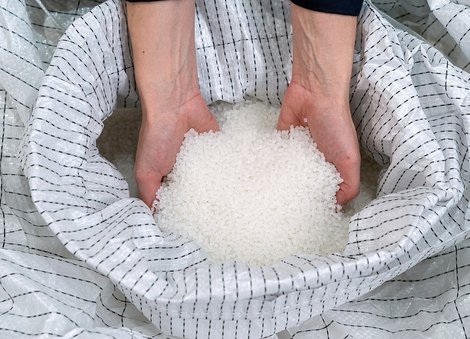Closing the loop for plastics
APK AG in Merseburg obtains single-variety plastics from waste with its Newcycling® process

This company in Saxony-Anhalt is the first that can produce single-variety recyclates from plastic composites on an industrial scale and offer these secondary raw materials as fully commercialized products. This process – the development of which was supported by the state of Saxony-Anhalt – is now part of the new focus on sustainability and the circular economy.
Bike panniers have to put up with a lot: sun and rain, heat and cold, tension, pressure, and friction – for years, if possible. For the fastening hooks of its new ReCycle pannier series, VAUDE used a high-performance, reinforced polyamide 6 recyclate from APK AG in Merseburg, Saxony-Anhalt. The material is produced using the innovative Newcycling® process – a physical, solvent-based recycling technique. But the resulting Mersamid® recyclate not only satisfies the requirements above, explains Julia Wunder, Business Development Manager at APK AG: “Of course, the material also has to be suitable for processing as the brand owner desires. Our material is extremely good for dyeing, which is an important factor. We are very proud that VAUDE has put its trust in our product, and we look forward to further exciting projects in the sports equipment field.”
Substituting goods made of virgin plastic
The company extracts two products from mixed plastic waste: Mersamid® and Mersalen®. The first is high-quality recycled PA6. “Polyamide is a plastic that can replace metals in numerous technical applications, for example. Thanks to its constant property profile and consistent quality, Mersamid® can replace new polyamide in complex injection moulding processes, for example,” explains Florian Riedl, Director of Business Development.
As for Mersalen®, it is a high-quality LDPE regranulate, with properties very similar to those of virgin plastic. It is therefore a viable substitute in flexible packaging, labels, films, and many other sophisticated applications. The properties of the granulate, such as its viscosity, mechanical values and almost complete absence of odor, are impressively constant.
Both products are fundamentally different yet made of the same source: mixed plastic waste. “Our products are manufactured from waste from multilayer film production. Until now, PE/PA film, a composite consisting of two different polymers, was extremely difficult to recycle because the plastics could not be separated for further processing using conventional recycling technology. These waste flows mainly ended up in the incinerator. “With the Newcycling® process, the polymers are separated, so that our single-variety products can be produced from these two different polymer streams,” says Florian Riedl. Riedl also explains that not only does this provide higher quality recyclates, it also vastly reduces the CO2 footprint: Mersamid® recyclates save 88% CO2 emission compared to virgin polyamide.
APK AG – a company of the future
When APK AG was founded in 2008, it had a vision: to create single-variety plastic in as-new quality from plastic waste, for the first time. With this goal in mind, the company continually developed its Newcycling® process until it finally achieved a breakthrough. The first industrial plant in Merseburg achieved a capacity of 12,000 t/a for recycling and 8,000 t/a for Newcycling®. The company currently has a workforce of around 130 and is looking to recruit more. Over the next few years, APK wishes to build new Newcycling® plants in collaboration with further partners. A second plant, which will use Newcycling® to recycle waste from household collections, is already in planning.
The Merseburg site has proven to be the perfect strategic location for the company. Thanks to the prominence of the chemicals and plastics industry in Central Germany, and in this region in particular, it can count on interest and support. The Investment Bank of Saxony-Anhalt has been assisting the company over the years, for instance. As a result, Newcycling® technology is also going to be licensed as a complete process, so that further plants can be built in Germany, Europe and the rest of the world. “We wish to express our special thanks to the state of Saxony-Anhalt for its support,” says Klaus Wohnig, Chairman of the Board of APK AG.
A fresh economic perspective
APK and its products are fully in line with Saxony-Anhalt’s economic perspective, which focuses on sustainability, and in particular on the circular economy and recycling – important steps for avoiding plastic waste. The world generates almost 80 million metric tons of plastic waste from packaging every year, with Germany’s figures at 6.3 million in 2019. Of this, only approximately 10% of the resources used is recovered through recycling; the rest is incinerated, buried in landfill, or simply ends up in the environment. The need for a genuine circular economy for plastics is growing more urgent all the time. But this is where conventional recycling processes hit their limits. Innovations in recycling are key to a sustainable future.
Saxony-Anhalt and the Merseburg region, with the neighboring Leuna Chemical Park, have an increasingly important part to play in chemicals and plastics management in Central Germany. This region is not only facing a major transition away from coal – the chemicals and plastics industries also need to evolve into a circular economy that uses raw materials more efficiently and offers products that make this possible. APK is right at the heart of this evolution. The company is closing the loop in the life cycle of plastic products: plastic – product – waste – recyclate – new product.
Auhor: Anja Falgowski/IMG Saxony-Anhalt
